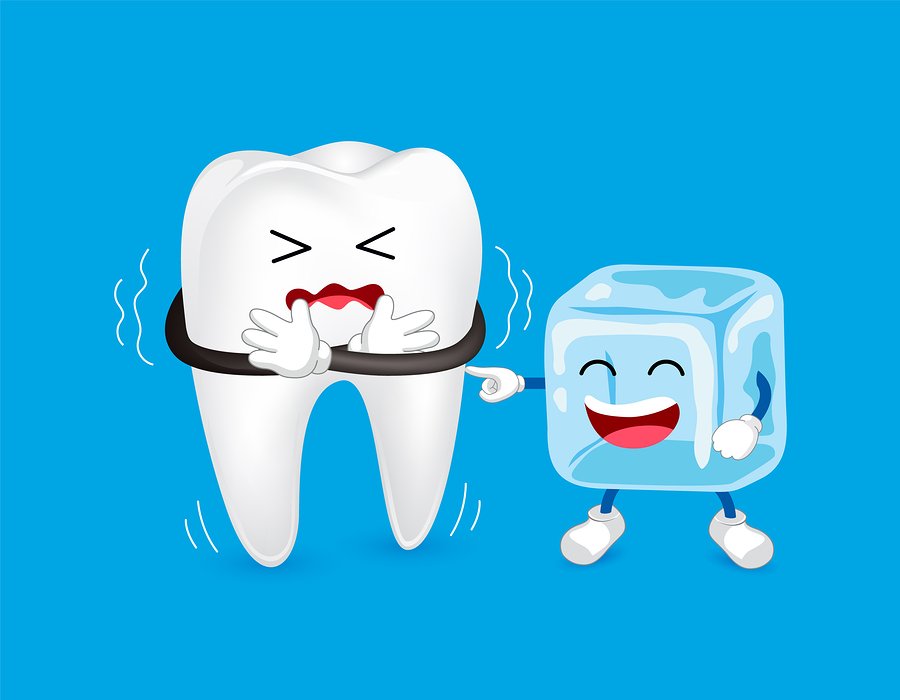Do you wince when brushing your teeth? Do coffee, tea and iced water make you rub your jaw in discomfort? You could be suffering from teeth sensitivity, a very common problem, caused by the exposure of certain tooth surfaces. Here are some of the most common causes of sensitive teeth, along with some ways to reduce or eliminate your symptoms.
1. Over-brushing:
Sometimes good intentions can lead to bad results. When you brush with too much force – or using a hard-bristled toothbrush – you can wear down your teeth. Over time, this abrasion can reduce protective layers, exposing microscopic hollow canals that lead right to your dental nerves. You may then experience discomfort or sensitivity when these canals are exposed to acidic foods or extreme temperatures. You can prevent this type of tooth sensitivity by brushing with good technique, using a soft-bristled toothbrush.
2. Acidic foods:
Because they wear down enamel, acidic foods can leave our nerves more exposed, while irritating them at the same time. Some common culprits include lemon, tomato sauce, pickles, kiwi and grapefruit. It’s generally best to limit these foods. If you do eat them, take a few moments to rinse your mouth with water afterward.
3. Grinding:
Since enamel is the most durable substance in the human body, it can hold up to considerable wear and tear. That said, if you grind your teeth, you will eventually wear down the enamel, exposing the hollow tubes leading to your nerves. If you grind your teeth at night, your local dentist can provide a customized mouth guard designed to fit your bite. If you grind during the day, you should talk to your dentist about behavioral strategies that will make you more aware of the problem.
4. Tooth-whitening toothpaste:
To make them more abrasive, many manufacturers add all sorts of tooth-whitening chemicals to their toothpaste formulas. Over time, this can wear down enamel and make your teeth more sensitive. If your toothpaste contains abrasive whitening agents, try switching to a basic fluoride toothpaste, and schedule a professional dental whitening procedure instead.
5. Too much mouthwash:
Many over-the-counter mouthwashes contain alcohol and other active ingredients that can promote tooth sensitivity, especially if your dentin is already exposed. If you notice a problem, simply skip the mouthwash and be more diligent with your brushing and flossing. If you can’t live without your mouthwash, try switching to a neutral fluoride rinse.
6. Periodontal problems:
Gingivitis, gum disease and receding gums can all make your teeth feel more sensitive. If a periodontal problem is the source of your sensitivity issues, your dentist will focus on treating the underlying disease.
7. Cavities or plaque:
A cavity can cause you to experience pain or sensitivity in the affected tooth. At the same time, excessive plaque buildup can also cause tooth enamel to wear away. This is why it’s so important to maintain good dental hygiene and schedule routine cleanings and examinations with your dentist.
8. Dental procedures:
You may experience sensitivity after an extraction, filling, root canal or the placement of a new crown. If symptoms don’t get better after a week or two, schedule another visit with your dentist to check for potential problems.
9. Cracked tooth:
Even the tiniest crack in a tooth can cause significant pain or sensitivity. If you can’t determine the source of your issue, visit your dentist for an exam.
10. Decay along fillings:
As they age, fillings can weaken, fracture or leak around their edges. This allows bacteria to gather in tiny crevices, leading to acid buildup that can eat away enamel. Inform your dentist of any symptoms, so you can get replacement fillings before it’s too late.
Sensitive Teeth Pain Relief
While the internet is filled with one sensitive teeth remedy after another, few – if any – address the underlying cause. If your tooth sensitivity is caused by a cavity or gum disease, you will require professional dental treatments to fix the problem. If the issue is related to exposed dentin, your dentist can provide a fluoride varnish, foam or gel to strengthen enamel and dentin. Bonding agents can also be used to seal the dentin surface, providing a barrier to the stimuli that promote sensitivity.


 Previous Article
Previous Article

